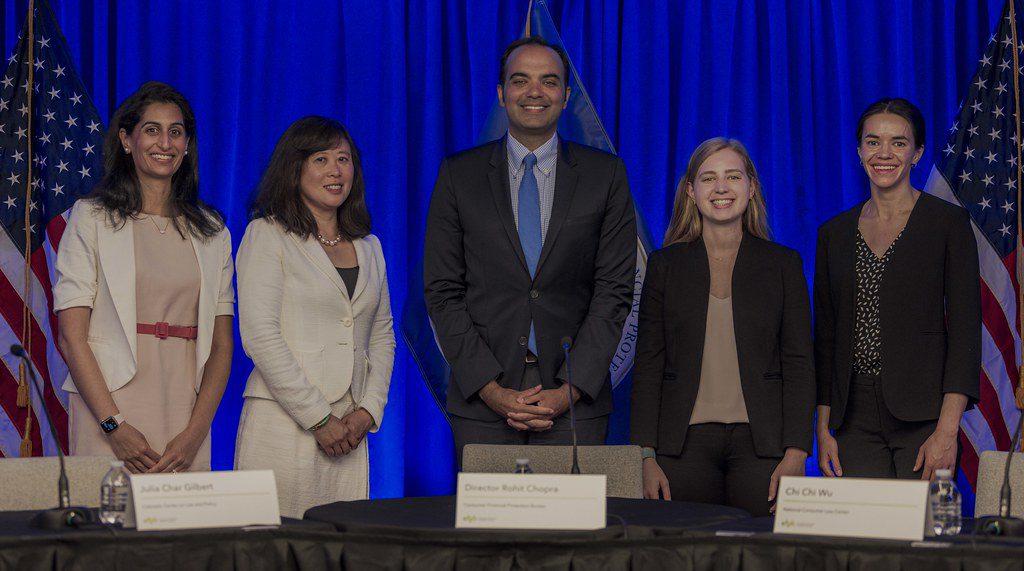Advocates celebrate bipartisan approval of bill to assess language access practices at state agencies
Recent articles
CCLP rallies in support of the CFPB
Charles Brennan joined partner organizations and leaders in Greeley, Colorado for a pro-Consumer Financial Protection Bureau rally.
CCLP testifies in support of prohibiting surveillance data to set prices and wages
Charles Brennan provided testimony in support of House Bill 25-1264, Prohibit Surveillance Data to Set Prices and Wages. CCLP is in support of HB25-1264, as it is one of our priority bills.
Press Release: Colorado Lawmakers Signal Ongoing Commitment to Tackling Algorithmic Exploitation
Landmark Debate on HB25-1264 Marks Critical Step in Taking on Surveillance Pricing and Discriminatory Wages
CCLP at Federal CFPB Hearing: Medical debt is a solvable crisis

On Tuesday, July 11, 2023, Julia Char Gilbert, CCLP’s Connelly Policy Advocate, was a panelist at the Consumer Financial Protection Bureau hearing on medical billing and collections in Washington, D.C. Watch a recording of the hearing here, and read her prepared remarks below.
Good morning, and thank you to Director Chopra, Deputy Director Martinez, CFPB staff, the U.S. Department of Health and Human Services, the U.S. Department of the Treasury, and the other speakers today for your work on this very important issue.
My name is Julia Char Gilbert, and I’m a Policy Advocate at the Colorado Center on Law and Policy, an anti-poverty advocacy nonprofit in Colorado.
I’d like to begin today by sharing the story of a community member named Misty.
When Misty was 23, she had open-heart surgery for a congenital heart defect. The surgery left her with $200,000 in medical bills that she was unable to pay. At the time, Misty was married to an abusive partner and wanted a divorce. But she got her health insurance through her husband, and because her medical debt had ruined her credit, Misty could not get housing, a car, or a credit card without her husband. As a result, Misty was forced to stay in an abusive relationship for years.
Misty’s story – and the fact that there are tens of millions of other Americans like Misty – should signal to us that there is something very wrong with our health care system.
I’d also like to underscore that medical debt is an urgent equity issue: Medical debt reflects and amplifies inequities in our society.
The communities that are least well served by our health care system and our economic systems are the communities that have the highest rates of medical debt. People of color, low-income people, people with disabilities, and women are all disproportionately impacted.
Furthermore, medical debt takes a toll on your health, and it creates barriers to economic stability. So, when we have marked disparities in who carries medical debt, we should be concerned about who is bearing the brunt of those downstream harms as well.
We applaud the CFPB and the Biden-Harris Administration for their leadership on medical debt to date. In particular, I’m pleased to share that the CFPB’s recent interpretive rule on preemption of the Fair Credit Reporting Act has catalyzed stronger consumer protections at the state level.
Just last month, Colorado became the first state in the country to prohibit credit reporting of medical debt, and New York is soon to follow. Medical debt is a poor predictor of creditworthiness, and we believe people deserve a fair chance at getting back on their feet after a major medical event. We estimate that these protections will provide relief for 1.4 million households in Colorado and New York, and we’re hopeful that other states will follow suit.
We’re excited about these victories, and we also know more work is needed.
We urge bold action to reduce harm for people who’ve incurred medical debt, including a nationwide ban on credit reporting of medical debt and stronger consumer protections around harmful financial products.
We also urge interventions further upstream to protect people from incurring medical debt in the first place. For example, we need more robust requirements for hospital financial assistance programs, to ensure that low-income patients aren’t facing bills they could never reasonably be expected to pay.
Medical debt is a crisis, but it is a solvable crisis. And we believe the CFPB and other federal agencies are well positioned to take additional action.
Thank you for your time and your continued leadership.

